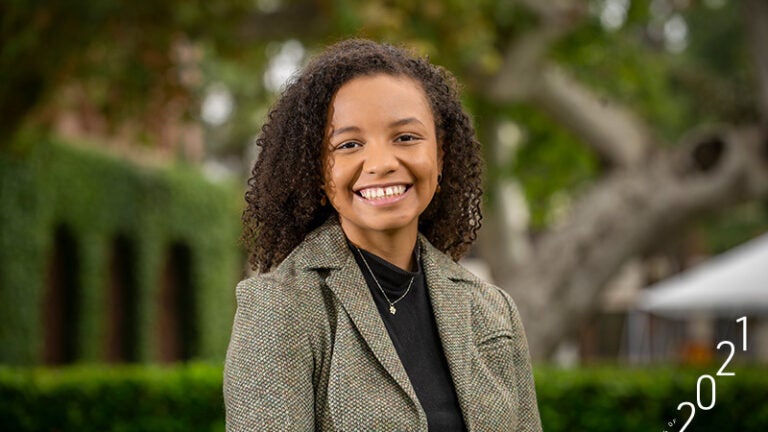
Valedictorian Tianna Shaw-Wakeman hopes to leave a lasting impact of sustainability
Tianna Shaw-Wakeman hadn’t even heard of USC until her senior year in high school in Nashville. She accepted her admission without ever visiting and did not set foot on campus until orientation, a month before classes started.
The moment she arrived on campus, though, she understood the opportunity she had, and she wasted no time pursuing her passions. From serving as co-director of USC Environmental Core to co-founding DivestSC, organizing USC’s 2019 climate strike or simply planting native trees at the University Park campus, Shaw-Wakeman has left her mark on a university that became home.
Now, after earning her bachelor’s degree in psychology from the USC Dornsife College of Letters, Arts and Sciences, that same person who didn’t even know what USC was is also graduating with her master’s in social entrepreneurship from the USC Marshall School of Business — and as 2021 valedictorian.
“My parents taught me that if you are living on this Earth, you have an extraordinary amount of positive responsibility to everybody you encounter,” Shaw-Wakeman said. “When you get to USC, when you have the opportunity to get this education …, then your positive responsibility is amplified manyfold.”
Born in Texas, Shaw-Wakeman spent much of her childhood in Charleston, S.C., before moving to Tennessee. She hadn’t visited L.A. since she was a child, so her first day at USC was a shock.
“There weren’t a lot of people who were southerners; there weren’t a lot of people who were Black; there weren’t a lot of people who were low-income. So it really was just an overwhelming world for me,” she said.
But just because it was a shock doesn’t necessarily mean it was discouraging.
“I was excited because I was in this environment that was purely for learning and purely for growth, and I just felt so lucky to be, not even just nationally but globally, a woman who gets to go to college,” she said.
Committed to on-campus sustainability
From the start, Shaw-Wakeman threw herself into the issues that mattered to her, like sustainability. During her freshman year, she joined USC’s Environmental Core. She organized various small rallies and helped organize the 2019 climate strike. More than 300 people attended, including USC’s then-new president, Carol L. Folt.
After more rallies and meetings, Shaw-Wakeman co-founded DivestSC, an organization committed to getting USC to divest from the fossil fuel industry and additionally reinvest those funds towards clean technologies and renewable energy.
“For any positive social change to really take place, I think you need the grassroots, bottom-up support,” she said. “But you also need administrators with more of the decision-making power to be on board.”
Those efforts proved successful, as the USC Board of Trustees’ Investment Committee voted earlier this year to liquidate current fossil fuel investments over the next several years and freeze new investments.
She wants to leave things better than she found them
Outside of her sustainability efforts on campus, Shaw-Wakeman also volunteered with Teach for Los Angeles to tutor elementary school students in reading and writing. Though she was a psychology major as an undergraduate, she always had teaching in mind and planned to teach English abroad after college. But with the pandemic, plans changed. She went into her master’s program for social entrepreneurship, an avenue she would have never thought about as a freshman, and completed her degree in December.
Whether she’s working on creating a more sustainable campus, teaching students to love reading and writing, or working to make a happier workforce, she seems to want to leave things a little better than how she found them.
“I only saw my role, working in sustainability and doing all the different things that I did, as trying to be a vessel for this energy and this vibrancy about how important sustainability is that was already there among the students,” she said. “I did what I did mostly so that I could represent a lot of people who had this desire and have this urgency around USC becoming sustainable.”